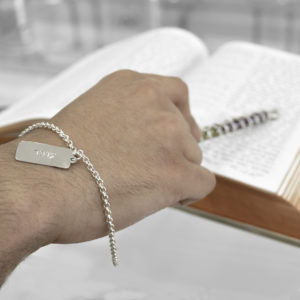
Aliyah Torah is a powerful concept that has been part of the Jewish faith for centuries. It refers to the idea that those who are descendants of Israel have a special connection with God, and it is said that their spiritual standing can be raised through acts of service.
Aliyah Torah encourages people to strive for excellence in all areas of life, from social justice to education, as they seek to fulfill their divine mission on earth.
This article explores what Aliyah Torah means and why it’s essential today.
To listen to this entire guide, click on the play button
Understanding Aliyah
Aliyah, a Hebrew term meaning “to go up,” has dual significance in Jewish culture. One interpretation relates to the spiritual ascent, honored when a member of the congregation is called upon to recite blessings and read a section from the Torah during a service—a privilege known as the Aliyah Torah.
In Aliyah Torah, the act of ascending signifies one’s rise to connect with God’s wisdom as manifested in the Torah. Historically, it became a means for Jewish people to reaffirm their identity and the covenant with God, especially during times of diaspora.
The Aliyah Torah Ceremony
The Aliyah Torah ceremony begins long before the Torah service in the synagogue. The honoree, known as the ‘Oleh,’ prepares by studying the assigned Torah portion in advance, often with the help of a tutor or rabbi.
Once the service commences, the Oleh is called up to the Torah by their Hebrew name. Approaching the bimah (the elevated platform), they touch their tallit (prayer shawl) to the place where the Torah scroll is to be read and then kiss the tallit. This act of reverence acknowledges the sanctity of the Torah.
Everything you need to know about Tallit Holders.
Next, the oleh recites the blessings before the Torah reading.
The Torah is then unrolled, and the specific section is read out loud, either by Oleh or a designated reader.
The oleh follows along in a printed Chumash (printed version of the Torah), ensuring the reading is accurate. Once the reading concludes, the oleh recites the concluding blessings, after which they may return to their seat.
The honor of being invited to perform an Aliyah holds great significance and is often a highlight of the individual’s spiritual journey.
Discover our thoughtfully designed tallit clips, crafted to gracefully hold your tallit in place while you ascend for the Torah reading. Embrace tradition with elegance and ease. Perfect for Jewish families seeking a blend of functionality and faith
To see what Aliya Torah looks like, click on the video
Blessings and Instructions for Getting an Aliyah
Securing an Aliyah is a revered privilege laden with essential responsibilities. Being chosen to ascend the bimah and recite the blessings over the Torah reading involves careful preparation and adherence to the sacred instructions and rituals.
This section delves into the specific blessings and detailed instructions that accompany the act of getting an Aliyah.
Blessings for an Aliyah
The blessings recited during an Aliyah frame the Torah reading, with one blessing before the reading and one after. They serve as a spiritual bridge between the sacred text and the congregation, acknowledging the sanctity and divine origin of the Torah.
Instructions for Getting an Aliyah
Being called for an Aliyah is a significant moment. To ensure respect and honor for the Torah, there are a set of instructions that are typically followed:

- Preparation: Ahead of the ceremony, the individual should familiarize themselves with the blessings and the specific Torah portion assigned for reading.
- Respectful Attire: Attendees at a synagogue are expected to dress modestly in respectful attire (with tallit and kippa of course).
- Approaching the Torah: When the Oleh name is called, they approach the Torah scroll on the bimah. It’s traditional to touch the corner of one’s tallit to the Torah scroll at the place where the reading will start and then kiss the tallit.
- Reciting the Blessings: The oleh recites the first blessing, listens attentively to the Torah reading, and follows along in the Chumash. After the reading, the concluding blessing is recited.
- Returning to One’s Seat: After reciting the concluding blessing, the oleh waits for the next oleh to be called up before returning to their seat. It is customary to return to one’s seat via a different route, symbolizing that each interaction with the Torah provides a new path to wisdom and understanding.
Enter to our collection of Silver Tallit Clips that will secure your tallit without during the Aliyah Torah ceremony.
Aliyah Torah at a Bar Mitzvah
A Bar Mitzvah is a big event for a Jewish boy. It means he is now an adult in the Jewish community. He is responsible for following Jewish law, studying the Torah, and helping the community.
A key part of the Bar Mitzvah ceremony involves the celebrant’s Aliyah to the Torah—an honor that symbolizes the young man’s new status and responsibilities.
Significance of Aliyah at a Bar Mitzvah
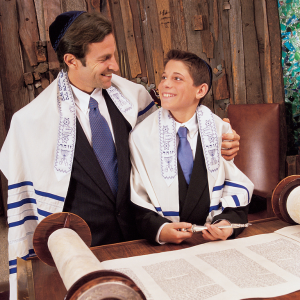 In the context of a Bar Mitzvah, the act of receiving an Aliyah takes on heightened significance. It is the first time the young man is called to the Torah as an adult, marking his official entrance into the adult Jewish community.
In the context of a Bar Mitzvah, the act of receiving an Aliyah takes on heightened significance. It is the first time the young man is called to the Torah as an adult, marking his official entrance into the adult Jewish community.
His Aliyah signifies that he is now responsible for his actions under Jewish law and can participate fully in all aspects of Jewish community life.
This includes the privilege of being counted in a minyan (A group of 10 adult Jews that is required for certain religious rituals in Judaism), leading prayers, and, of course, being called to the Torah for future Aliyahs.
Explore our Torah pointers and discover the ideal Torah pointer for you or your beloved son
Preparations for the Aliyah
Preparation for the Aliyah at a Bar Mitzvah often begins many months in advance. The young man, guided by a tutor or rabbi, diligently learns to chant the Torah portion (parashah) that falls on the date of his Bar Mitzvah. This also includes mastering the trop, the unique cantillation marks that guide the chanting of the Torah.
Simultaneously, the Bar Mitzvah boy learns to recite the blessings before and after the Torah reading. He may also learn to lead parts of the prayer service and to chant special Psalms (Tehillim) that are recited on the day of the Bar Mitzvah.
The Aliyah Ceremony
On the day of the Bar Mitzvah, the young man is called up to the Torah as an adult for the first time. As is customary, he may use a Torah pointer to guide his reading, ensuring that the sacred text is not touched directly by human hands.
After reciting the blessings, he chants the assigned Torah portion. In many congregations, the Bar Mitzvah boy also delivers a d’var Torah, a short speech that explores the themes and lessons of the Torah portion he has just read.
The honor of this first Aliyah is typically extended to the Bar Mitzvah boy alone, but in some communities, it is customary for the boy’s father also to receive an Aliyah, during which he recites a special blessing thanking God for helping them reach this special day.
What Does a Boy Need to Read for a Bar Mitzvah?
For a Bar Mitzvah, the boy needs to learn the blessings and be able to read his assigned Torah portion. He will also need to learn the traditional chant (trope) to recite these sections correctly.
Depending on the synagogue’s tradition, he may also give a D’var Torah or short speech about the Torah portion’s meaning and its relevance to his life. In some synagogues, he may also be asked to read from the Haftarah portion.
To see what a bar mitzvah child reads the Torah at our bar mitzvah, click on the video
Why is the bar mitzvah at 13?
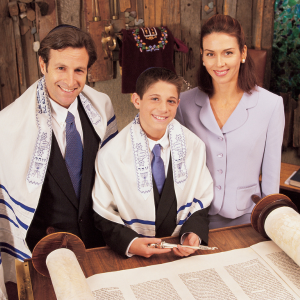 The age of 13 is seen as a time of great potential for learning and growth, and recognizing this change in status at this age encourages young people to take on increased responsibility in their lives.
The age of 13 is seen as a time of great potential for learning and growth, and recognizing this change in status at this age encourages young people to take on increased responsibility in their lives.
This teaches them the importance of commitment and the value of service to their community.
Additionally, it is a celebration of a boy’s journey into adulthood and his newfound privileges and obligations.
How Long Does the Aliyah Process Take?
The process of Aliyah to the Torah during a synagogue service typically takes around 5 to 10 minutes per individual called up, but the timing can vary.
Factors that can change the length of the process include the length of the specific Torah reading, the individual’s proficiency in reading or chanting the blessings, and local or congregational customs.
Check our Personalized Tallit Clips Collection that will add a personal touch to your Aliyah Torah ceremony.
What do you need for Aliyah to the Torah?
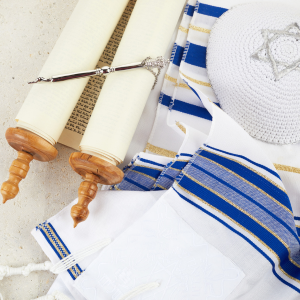 In addition to the necessary knowledge of blessings and Tropes, some items may be required for Aliyah. Some individuals choose to dress specially for the occasion. This might include wearing a tallit (prayer shawl), kittel (white robe-like garment), and yarmulke.
In addition to the necessary knowledge of blessings and Tropes, some items may be required for Aliyah. Some individuals choose to dress specially for the occasion. This might include wearing a tallit (prayer shawl), kittel (white robe-like garment), and yarmulke.
Additionally, it is customary to kiss the Torah scroll before and after the reading. For this purpose, an individual might bring a special object such as a handkerchief, scarf, or prayer book cover to kiss.
Finally, many congregations require that all those called to the bimah for an Aliyah wear a kippah. This is a sign of respect for the Torah and the occasion.
The kippah can be store-bought or handmade, so long as it is respectful in design.
Check out: Perfect Gifts for Every Jewish Occasion.
What is the Purpose of the Aliyah Torah?
The Aliyah to the Torah serves multiple purposes in Jewish liturgical tradition:
- Engagement with Sacred Texts: It provides a structure for engaging directly with the sacred texts of the Torah.
- Inclusion in the Community: The honor of being called to the Torah for an Aliyah reinforces a sense of inclusion and participation within the synagogue community.
- Recognition of Milestones: On special occasions, such as a Bar or Bat Mitzvah, a Jewish wedding, or a baby naming, an individual or family might be given an Aliyah to recognize and celebrate the milestone.
Check out our Jewish Occasions collection.
How to Make Aliyah to the Torah?
Making an Aliyah to the Torah involves a few key steps:
- Be Called: An individual must first be invited to have an Aliyah. This typically happens during a synagogue service when the Torah is read. The person leading the service will call you by your Hebrew name.
- Approach the Torah: When called, approach the Torah on the bimah (the raised platform in the synagogue). It’s traditional to touch the corner of one’s tallit (prayer shawl) to the Torah scroll at the start of the reading and then kiss the tallit.
- Recite the Blessings: There are specific blessings to recite before and after the Torah reading. You’ll need to recite the first blessing, listen to the Torah reading, and then recite the concluding blessing. If you’re unfamiliar with the blessings, learning them beforehand or having a written copy with you is recommended.
- Return to Your Seat: After reciting the concluding blessing, step back from the Torah and wait for the next person to be called up before returning to your seat. It is customary to return via a different route.
Explore our Yad Torah Pointers and discover the ideal Torah pointer for you or your beloved son
What is the Importance of the Aliyah Torah?
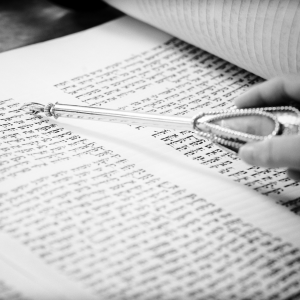 The Aliyah to the Torah holds deep importance in Jewish religious life:
The Aliyah to the Torah holds deep importance in Jewish religious life:
- Communal Bonding: It promotes bonding within the community as members come together to participate in a collective ritual.
- Sacred Interaction: It provides an opportunity for individuals to have direct, personal interaction with the Torah, the most sacred object in Judaism.
- Continuity of Tradition: It represents the continuity of Jewish tradition and the ongoing commitment of Jewish people to engage with their religious texts.
- Recognition of Adulthood: In the context of a Bar or Bat Mitzvah, the Aliyah signifies the young person’s entry into religious adulthood.
- Expression of Gratitude: In some traditions, individuals may have an Aliyah to express gratitude or to request blessings during significant life events.
Conclusion
Aliyah Torah, a tradition rooted in reverence, responsibility, and spiritual connection, holds immense significance in Jewish religious practice.
Despite the changing times, it serves as a spiritual compass guiding the Jewish community toward their religious duties and connecting them to their rich heritage.
Whether you are a Jew or an interested observer, understanding the ritual of the Aliyah Torah offers insights into the profound relationship between a community and its sacred text.







